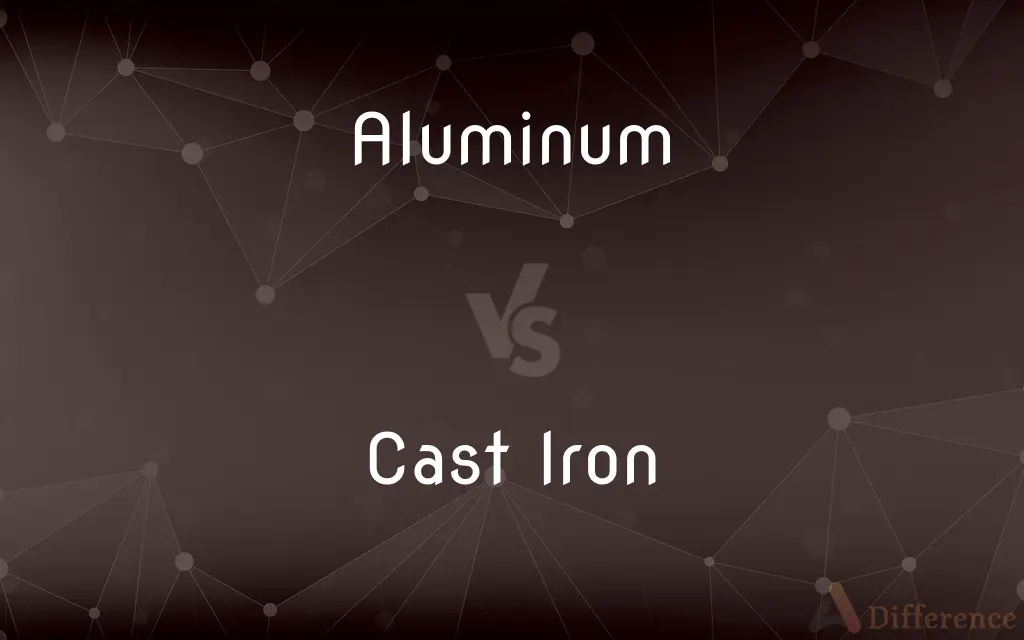Aluminum vs. Cast Iron — What's the Difference?
By Tayyaba Rehman — Published on November 8, 2023
Aluminum is a lightweight, corrosion-resistant metal, while cast iron is a heavy, durable iron alloy with carbon content.

Difference Between Aluminum and Cast Iron
Table of Contents
ADVERTISEMENT
Key Differences
Aluminum stands out due to its lightweight nature and excellent resistance to corrosion. Cast Iron, by contrast, is known for its significant weight and unparalleled durability.
The versatility of Aluminum makes it a favorite in various industries like aviation, where weight is critical. Cast Iron's weight and heat retention properties are especially prized in cookware and heavy-duty machinery.
While Aluminum is lauded for being non-toxic and non-magnetic, Cast Iron provides the advantage of even heat distribution and a natural non-stick surface when seasoned.
From an environmental standpoint, Aluminum is recyclable, reducing waste in landfills. Cast Iron, too, holds its own by being long-lasting, often becoming family heirlooms passed down generations.
Comparison Chart
Weight
Lightweight
Heavy
ADVERTISEMENT
Corrosion Resistance
High
Can rust if not seasoned or protected
Usage
Aviation, packaging, electronics
Cookware, machinery, engine blocks
Thermal Conductivity
High, heats quickly
Moderate, retains heat well
Environmental Impact
Recyclable, reduces landfill waste
Long-lasting, often passed down generations
Compare with Definitions
Aluminum
Aluminum is a silvery-white, ductile metal.
Manufacturers prefer Aluminum for aircraft construction due to its lightness.
Cast Iron
Cast Iron has excellent heat retention properties.
The Cast Iron radiator maintained warmth long after being turned off.
Aluminum
Aluminum is known for its corrosion resistance.
Boats made from Aluminum resist saltwater corrosion efficiently.
Cast Iron
Cast Iron is known for its durability and strength.
The Cast Iron bridge has withstood the elements for over a century.
Aluminum
Aluminum is recyclable and eco-friendly.
Recycling Aluminum cans significantly reduces environmental waste.
Cast Iron
Cast Iron requires seasoning to prevent rust.
A well-seasoned Cast Iron pan can last for generations.
Aluminum
Aluminum is an excellent conductor of electricity.
Aluminum wires are commonly found in electrical transmission lines.
Cast Iron
Cast Iron is an iron alloy with a high carbon content.
Many chefs swear by their Cast Iron skillets for even cooking.
Aluminum
Aluminum is the third most abundant element in the Earth's crust.
Mining companies extract Aluminum ore from bauxite deposits.
Cast Iron
Cast Iron items can be heirloom pieces.
Grandma's Cast Iron skillet has been passed down through the family.
Aluminum
A silvery-white, ductile metallic element, the most abundant in the earth's crust but found only in combination, chiefly in bauxite. Having good conductive and thermal properties, it is used to form many hard, light, corrosion-resistant alloys. Atomic number 13; atomic weight 26.9815; melting point 660.32°C; boiling point 2,519°C; specific gravity 2.70; valence 3. See Periodic Table.
Cast Iron
Made of cast iron.
Aluminum
Standard spelling of aluminium
Cast Iron
Rigid; inflexible
A cast-iron rule.
Aluminum
The metallic element forming the base of alumina. This metal is white, but with a bluish tinge, and is remarkable for its resistance to oxidation, and for its lightness, having a specific gravity of about 2.6. Atomic weight 27.08. Symbol Al. Also called aluminium.
Cast Iron
Exceptionally strong or resistant
A cast-iron stomach.
Aluminum
A silvery ductile metallic element found primarily in bauxite
Cast Iron
Alternative spelling of cast iron
Cast Iron
Alternative spelling of cast iron
Cast Iron
Made of cast iron. Hence, Fig.: like cast iron; hardy; unyielding.
Cast Iron
Extremely robust;
An iron constitution
Common Curiosities
Is Aluminum recyclable?
Yes, Aluminum is highly recyclable and often reused in new products.
What are common uses for Aluminum?
Aluminum is commonly used in aviation, packaging, and electronics.
Does Cast Iron rust easily?
Cast Iron can rust if not seasoned or protected from moisture.
What gives Cast Iron its non-stick property?
When seasoned, Cast Iron develops a natural non-stick surface.
What's the primary characteristic of Aluminum?
Aluminum is known for its lightweight and corrosion-resistant properties.
Can Cast Iron be passed down generations?
Yes, durable Cast Iron pieces often become family heirlooms.
Why might one choose Cast Iron over Aluminum for cookware?
Cast Iron retains and distributes heat effectively, making it ideal for slow-cooking and even frying.
Why is Cast Iron favored in cookware?
Cast Iron retains heat well and distributes it evenly, making it ideal for cooking.
How is Aluminum extracted?
Aluminum is extracted from bauxite ore through the Bayer process.
Is Aluminum magnetic?
No, Aluminum is non-magnetic.
Share Your Discovery

Previous Comparison
Synapsis vs. Crossing Over
Next Comparison
Insects vs. ArachnidsAuthor Spotlight
Written by
Tayyaba RehmanTayyaba Rehman is a distinguished writer, currently serving as a primary contributor to askdifference.com. As a researcher in semantics and etymology, Tayyaba's passion for the complexity of languages and their distinctions has found a perfect home on the platform. Tayyaba delves into the intricacies of language, distinguishing between commonly confused words and phrases, thereby providing clarity for readers worldwide.












































